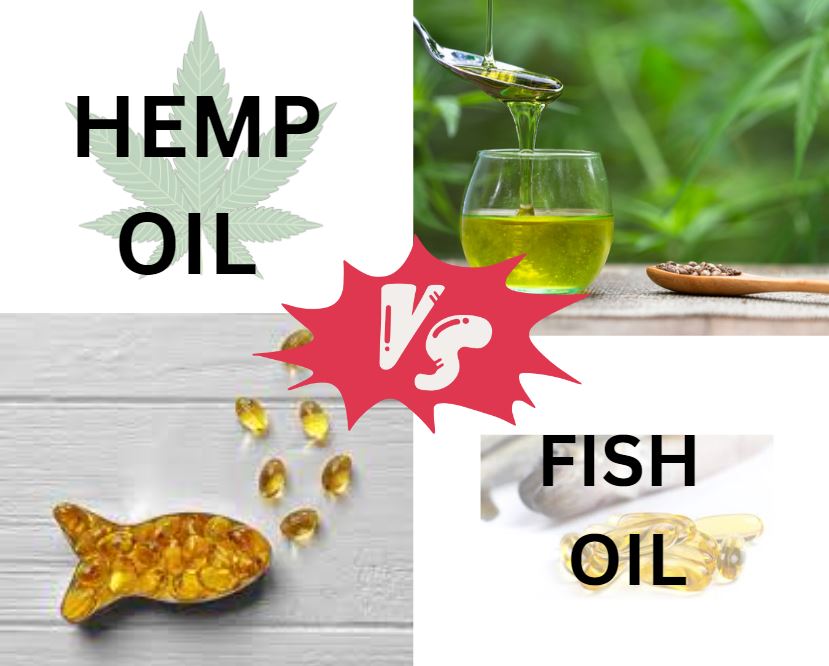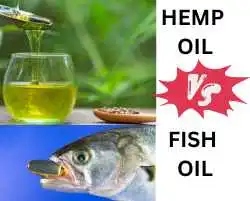The journey toward optimal health is often full of daunting decisions, especially when it comes to choosing the right nutritional supplements. Given the abundance of choices in today’s market, the process of making a selection can be incredibly daunting. A common quandary many face is choosing between hemp oil and fish oil. Both options boast distinct health benefits, yet the question remains: which one is superior for your well-being? To gain a comprehensive understanding, let’s delve into an in-depth comparison of these two. First, let’s explore the basics of each.
Hemp Oil vs Fish Oil
Hemp Oil
Obtained from the seeds of the hemp plant, Cannabis sativa, hemp oil is distinct from CBD oil, as the latter is extracted from the plant’s leaves, flowers, and stalks. Hemp oil is abundant in vital nutrients like omega-3 and omega-6 fatty acids, proteins, vitamins, and minerals. Its earthy taste makes it an excellent complement to various dishes and skincare products.
Fish Oil
Fish oil, derived from oily fish such as salmon, mackerel, and tuna, is highly regarded for its abundant omega-3 fatty acids, notably eicosapentaenoic acid (EPA) and docosahexaenoic acid (DHA). These compounds are linked to various health advantages, spanning from heart health to improved brain function.
Now that we’ve established a basic understanding of the two, let’s delve into the pros and cons of each.
Hemp Oil of Pros and Cons
Pros
Balanced Ratio of Omega-6 to Omega-3:
Unlike most oils, hemp oil offers a balanced 3:1 ratio of omega-6 to omega-3 fatty acids, which is ideal for the human body.
High in Antioxidants:
Hemp oil is rich in Vitamin E and other antioxidants that help protect against cell damage and inflammation.
Plant-Based Source:
For vegans and vegetarians, or those allergic to fish, hemp oil provides a plant-based source of essential fatty acids.
Cons:
Low EPA and DHA:
Hemp oil contains alpha-linolenic acid (ALA), which the body can convert into EPA and DHA, but this conversion is not very efficient.
Variable Quality:
The quality and composition of hemp oil can vary significantly depending on the growing and extraction conditions.
Fish Oil of Pros and Cons:
Pros:
High EPA and DHA:
Fish oil is a direct source of EPA and DHA, which have more potent health benefits compared to ALA found in hemp oil.
Extensive Research:
The plethora of scientific evidence overwhelmingly supports the health advantages of fish oil, with a particular focus on its positive effects on heart and brain health.
Cons:
Heavy Metal Contamination:
Certain types of fish may contain high levels of heavy metals, like mercury, which can be harmful to health if consumed in large amounts.
Not Suitable for Everyone:
Fish oil is not an option for vegetarians, vegans, or people with fish allergies.
Comparative Analysis Hemp Oil And Fish Oil
-
Omega-3 Content:
While both oils contain omega-3 fatty acids, the type of omega-3 makes a difference. Fish oil provides EPA and DHA directly, whereas the body has to convert the ALA in hemp oil into these beneficial compounds.In humans, the conversion process of hemp oil is inefficient, necessitating a higher consumption of hemp oil compared to fish oil to attain equivalent benefits.
-
Sustainability:
From an environmental perspective, hemp oil has an edge.Hemp, being a resilient plant that thrives rapidly in diverse climates, emerges as a sustainable option. Overfishing and fish farming can have negative environmental impacts, bringing into question the long-term sustainability of fish oil.
-
Dietary Restrictions:
For vegans, vegetarians, and those with fish allergies, hemp oil is the clear winner. It offers a plant-based alternative to obtain essential fatty acids that are otherwise primarily found in animal products.
-
Health Benefits:
While both oils offer numerous health benefits, current research supports the use of fish oil for specific conditions, such as heart disease and certain mental health conditions, due to its high EPA and DHA content. On the other hand, hemp oil is renowned for its remarkable skin health benefits and potent anti-inflammatory properties.
Can we use Hemp Oil and Fish Oil together?
Yes, there is no known harm in using hemp oil and fish oil together. Both offer unique nutritional benefits. Nevertheless, it is always advisable to seek guidance from a healthcare professional before commencing any new supplement regimen.
Does hemp oil contain CBD? Hemp oil, extracted from hemp seeds, does not contain CBD or other cannabinoids. CBD is derived from the leaves, flowers, and stalks of the hemp plant.
Who should avoid taking Fish Oil?
- People with Fish or Seafood Allergies: This group should avoid fish oil unless under the guidance of a healthcare provider, as fish oil may trigger an allergic reaction.
- Individuals on Blood-Thinning Medication: Fish oil possesses a blood-thinning effect that may amplify the impact of blood-thinning medications, potentially resulting in excessive bleeding.This includes individuals taking medications like warfarin or aspirin.
- People Preparing for Surgery: Due to its potential blood-thinning effect, it’s often recommended to stop taking fish oil a few weeks before undergoing surgery to reduce the risk of excessive bleeding.
- Individuals with a Hormone-Sensitive Condition: Some research suggests that fish oil may act like estrogen in the body. If you have a condition that could be worsened by exposure to estrogen, such as certain types of cancer, avoid using fish oil without talking to your doctor.
- Vegans and Vegetarians: As fish oil is derived from fish, it’s not suitable for those following a vegan or vegetarian diet.
Who should avoid taking Hemp Oil?
- People with Blood Clotting Disorders: Hemp oil can potentially affect blood platelets and anticoagulants. Prior to initiating hemp oil usage, individuals with blood clotting disorders should consult their doctor for professional guidance.
- People with Low Blood Pressure: High doses of hemp oil can cause a minor drop in blood pressure, which might cause light-headedness.
- Individuals Taking Medication: Hemp oil can interact with certain medications, including those for heart diseases and blood clotting disorders. Before commencing any new supplement while on medication, it is essential to seek advice from a healthcare provider.
- People Preparing for Surgery: Similar to fish oil, due to its potential effect on blood clotting, it’s often recommended to stop taking hemp oil a few weeks before undergoing surgery.
Keep in mind that this list is not exhaustive, and responses to supplements can differ from person to person. Prioritizing your safety and well-being, it is crucial to consult with a healthcare provider before initiating any new supplement regimen, especially if you have underlying health conditions or take regular medication. When deciding between hemp oil and fish oil, the choice ultimately hinges on your specific needs, dietary restrictions, and health objectives.
Side Effects of Hemp Oil and Fish Oil
| Properties | Hemp Oil | Fish Oil |
| Digestive Issues | Can cause loose stools or diarrhea | Can cause nausea, heartburn, or diarrhea |
| Low Blood Pressure | May lower blood pressure | Can lower blood pressure |
| Bleeding | May affect blood clotting | Can have a blood-thinning effect |
| Allergic Reactions | Uncommon but can occur | Common in people with fish allergies |
| Bad Taste | Rarely | Can cause a fishy aftertaste or bad breath |
| Interactions with Medications | Can interact with heart and blood clotting medications | Can interact with blood-thinning medications |
Please note that these are potential side effects and many people may not experience them. On the other hand, if you prefer a plant-based oil with abundant nutrients and a sustainable profile, or if you have dietary restrictions or allergies to consider, opting for hemp oil might be the ideal choice.
FAQS
What is fish oil?
Derived from the tissues of oily fish like salmon, mackerel, and tuna, fish oil boasts high levels of omega-3 fatty acids, notably eicosapentaenoic acid (EPA) and docosahexaenoic acid (DHA), both recognized for their numerous health benefits.
Are there vegan alternatives to fish oil?
Yes, hemp oil is a plant-based alternative to fish oil. It provides essential fatty acids, proteins, and other nutrients. However, the body is less efficient at converting the form of omega-3 in hemp oil (alpha-linolenic acid, or ALA) into the EPA and DHA it needs, compared to consuming fish oil directly.
What are the environmental impacts of hemp oil vs fish oil?
Hemp is a sustainable plant that grows quickly in various climates, making it an environmentally friendly choice. Overfishing and fish farming, on the other hand, can have detrimental environmental impacts, raising sustainability concerns around fish oil production.
What are the health benefits of hemp oil and fish oil?
Both oils offer numerous health benefits. Fish oil is renowned for heart and brain health, owing to its high EPA and DHA content. Hemp oil is celebrated for its skin health benefits and anti-inflammatory properties.
How can I incorporate hemp oil and fish oil into my diet?
Fish oil is often consumed as a dietary supplement in capsule form. Hemp oil can also be taken as a supplement but is versatile and can be used as a cooking oil, added to smoothies, or even applied topically for skin health.
Are there any potential side effects to taking hemp oil or fish oil?
Both oils are generally well-tolerated, but they can cause some minor side effects. Fish oil may cause bad breath, heartburn, nausea, and diarrhea. Hemp oil may lead to digestive issues for some people. Always start with a lower dose to see how your body reacts and consult a healthcare provider if side effects persist.
Conclusion
When choosing between hemp oil and fish oil, it ultimately depends on your individual needs, dietary restrictions, and health goals. If you’re looking for high amounts of EPA and DHA to support heart or brain health, fish oil is likely the superior choice. However, if you’re after a plant-based oil that’s rich in nutrients and more sustainable, or if you have dietary restrictions or allergies, hemp oil may be the way to go.
Always bear in mind the importance of consulting with a healthcare provider before commencing any new supplement regimen. They can offer personalized advice tailored to your specific health status and individual needs.

